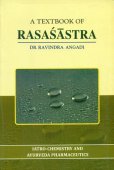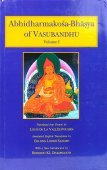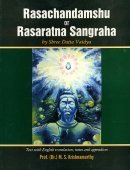Prakarana, Prakaraṇa, Prākaraṇa: 28 definitions
Introduction:
Prakarana means something in Hinduism, Sanskrit, Jainism, Prakrit, the history of ancient India, Marathi, Hindi. If you want to know the exact meaning, history, etymology or English translation of this term then check out the descriptions on this page. Add your comment or reference to a book if you want to contribute to this summary article.
Alternative spellings of this word include Prakaran.
In Hinduism
Natyashastra (theatrics and dramaturgy)
Source: Wisdom Library: Nāṭya-śāstra1) Prakaraṇa (प्रकरण) refers to one of the “ten kinds of dramatic plays” (daśarūpa), according to the Nāṭyaśāstra chapter 20. These different types of dramas are considered to have originated from the various styles (vṛtti), which is discussed in chapter 22 of the same work. The Prakaraṇa type of drama includes the following styles: Verbal (bhāratī), Grand (sāttvatī) and Energetic (ārabhaṭī).
2) Prakaraṇa (प्रकरण) refers to one of the twenty aspects of tāla (time-measure), according to the Nāṭyaśāstrahapter chapter 28. In musical performance, tāla refers to any rhythmic beat or strike that measures musical time. It is an important concept in ancient Indian musical theory (gāndharvaśāstra) traceable to the Vedic era.
Source: archive.org: Natya ShastraOne of the Ten Types of Play (nāṭya).—Prakaraṇa: the second species of Hindu play, is the Prakaraṇa which resembles the Nāṭaka in all respects except that “it takes a rather less elevated range”. Its Plot is to be original and drawn from real life and the most approprtiate theme is love. The Hero may be a Brahmin, merchant, minister, priest, and officer of the king or a leader of the army. The female characters include a courtezan or a depraved woman of good family. But the courtezan should not meet the Hero when he is in the company of a lady or gentleman of high family, and if the courtezans and respectable ladies must meet on any account they are to keep their language and manners undistorted. From these and other features, the Prakaraṇa has been called a bourgeois comedy or comedy of manners of a rank below royalty.
Śūdraka’s Mṛcchakaṭika and Bhavabhūti’s Mālatīmādhava are well-known examples of the Prakaraṇa.
Source: Shodhganga: Elements of Art and Architecture in the Trtiyakhanda of the Visnudharmottarapurana (natya)Prakaraṇa (प्रकरण) refers to one of the twelve kinds of Rūpaka, which represents the dṛśyakāvya division of Kāvya (“poetry”), according to the Viṣṇudharmottarapurāṇa, an ancient Sanskrit text which (being encyclopedic in nature) deals with a variety of cultural topics such as arts, architecture, music, grammar and astronomy.—The Viṣṇudharmottarapurāṇa states that the plot of a prakaraṇa should be imaginary. While the Viṣṇudharmottarapurāṇa says only one line about prakaraṇa, the Nāṭyaśāstra gives three requirements of a prakaraṇa in an expanded way. According to the Nāṭyaśāstra, the characters in a prakaraṇa are Brahmin, merchant, minister, priest and officer. Following the Nāṭyaśāstra, the Sāhityadarpaṇa states that the hero of a prakaraṇa should be a Brahmin, minister or a merchant. In a prakaraṇa the heroin is suggested to come from a good family or sometimes to be a courtesan by her profession.

Natyashastra (नाट्यशास्त्र, nāṭyaśāstra) refers to both the ancient Indian tradition (shastra) of performing arts, (natya—theatrics, drama, dance, music), as well as the name of a Sanskrit work dealing with these subjects. It also teaches the rules for composing Dramatic plays (nataka), construction and performance of Theater, and Poetic works (kavya).
Vedanta (school of philosophy)
Source: archive.org: Mandukya Upanishad & Karika with Shankara BhashyaA Prakaraṇa (treatise) has four indispensable elements (anubandha) literally, “what sticks to another,” namely,
- the determination of the fitness of the student for the study of the treatise (abhikārī),
- the subject-matter (viṣaya),
- the mutual relationship (sambandha) between the treatise and the subject-matter (which is that of the explainer and the explained)
- and the object to be attained by the study, i.e., its utility (prayojana).

Vedanta (वेदान्त, vedānta) refers to a school of orthodox Hindu philosophy (astika), drawing its subject-matter from the Upanishads. There are a number of sub-schools of Vedanta, however all of them expound on the basic teaching of the ultimate reality (brahman) and liberation (moksha) of the individual soul (atman).
Mīmāṃsā (school of philosophy)
Source: Srimatham: Mīmāṃsa: The Study of Hindu ExegesisPrakaraṇa (प्रकरण, “context”) refers to one of the various tools used by authors displaying their skill in the art of writing.—When the validity of an injunction or teaching is dependant upon a specific time (kāla) place (deśa) and circumstance (pātra). Not all injunctions are perpetually valid and they need to be applied according to the context (prakaraṇa) given within the passage. If the context is not explicitly stated then one should apply reason.

Mimamsa (मीमांसा, mīmāṃsā) refers to one of the six orthodox Hindu schools of philosophy, emphasizing the nature of dharma and the philosophy of language. The literature in this school is also known for its in-depth study of ritual actions and social duties.
Vyakarana (Sanskrit grammar)
Source: Shodhganga: Vaiyākaraṇabhūṣaṇasāra: a critical studyPrakaraṇa (प्रकरण).—Context; a section where a particular subject is treated.
Source: Wikisource: A dictionary of Sanskrit grammarPrakaraṇa (प्रकरण).—Topic; context; a section wherein a particular subject is treated; cf. अर्थात् प्रकरणाद्वा लोके कृत्रि-माकृत्रिमयोः कृत्रिमे संप्रत्ययो भवति (arthāt prakaraṇādvā loke kṛtri-mākṛtrimayoḥ kṛtrime saṃpratyayo bhavati) M.Bh. on I. 1. 23; cf. also सामान्यशब्दाश्च नान्तरेण विशेषं प्रकरणं वा विशेषेष्ववतिष्ठन्ते (sāmānyaśabdāśca nāntareṇa viśeṣaṃ prakaraṇaṃ vā viśeṣeṣvavatiṣṭhante) M. Bh. on I. 2.45 Vart 9.

Vyakarana (व्याकरण, vyākaraṇa) refers to Sanskrit grammar and represents one of the six additional sciences (vedanga) to be studied along with the Vedas. Vyakarana concerns itself with the rules of Sanskrit grammar and linguistic analysis in order to establish the correct context of words and sentences.
Shaivism (Shaiva philosophy)
Source: Shodhganga: Iconographical representations of ŚivaPrākaraṇa (प्राकरण) or Prākaraṇāgama refers to one of upāgamas (supplementary scriptures) of the Aṃśumāgama which is one of the twenty-eight Siddhāntāgama: a classification of the Śaiva division of Śaivāgamas. The Śaivāgamas represent the wisdom that has come down from lord Śiva, received by Pārvatī and accepted by Viṣṇu. The purpose of revealing upāgamas (e.g., Prākaraṇa Āgama) is to explain more elaborately than that of mūlāgamas (e.g., Aṃśumān-āgama) and to include any new idea if not dealt in mūlāgamas.
Source: Brill: Śaivism and the Tantric TraditionsPrakaraṇa (प्रकरण) refers to a “treatise”, according to Utpaladeva’s Īśvarapratyabhijñākārikāvṛtti (on the Īśvarapratyabhijñākārikā verse 4.16).—Accordingly, “This new, direct path was foretold in the treatise (prakaraṇa) entitled the Śivadṛṣṭi by the venerable Somānanda, whose very appearance is that of the great lord Parameśvara in front of one’s eyes; I have made it [i.e., this path] enter the heart(s) (of men) by furnishing a logical justification for it. By pursuing (pariśīlana) this [path] one becomes liberated in this very life, this as a result of being (fully) penetrated by Śiva-nature”.

Shaiva (शैव, śaiva) or Shaivism (śaivism) represents a tradition of Hinduism worshiping Shiva as the supreme being. Closely related to Shaktism, Shaiva literature includes a range of scriptures, including Tantras, while the root of this tradition may be traced back to the ancient Vedas.
General definition (in Hinduism)
Source: Wisdom Library: Hinduism1) Used to indicate a chapter or section of a book.
2) Sanskrit literature not based on epic stories (e.g. Mahabharata or Ramayana).
Source: Rare Books: What is a प्रकरण ग्रन्थ ?The scholars say that prakaraṇa grantha is: A section of the vedānta śāstra. Enables a thorough understanding of the śāstra.
There are granthabhedaṃ four types of prakaraṇa-granthas:
- Those that explain the doctrines of vedānta-śāstra – (pañcadaśī)
- Those that condemn anti advaita doctrines to establish advaita siddhānta – (ajñānadvāntacandrabhāskara)
- Those which present the rich experience of the authors – (anubhūti-prakāśa)
- Explain advaita tattva in alitraray manner – (yoga-vāsiṣṭha)
In Jainism
Jain philosophy
Source: archive.org: Anekanta Jaya Pataka of Haribhadra SuriPrakaraṇa (प्रकरण) usually means a “chapter” or a “section” of a work. Alternatively, prakaraṇa means a “small treatise wherein one particular subject is predominantly treated”. Thus the word prakaraṇa is applicable to works written in verse, too, and as a matter of fact, its Pāiya (Prākṛta) equivalent pagaraṇa is used for Siddhasena Divākara’s Sammaipagaraṇa—a versified work.
-
India history and geography
Source: Cologne Digital Sanskrit Dictionaries: Indian Epigraphical GlossaryPrakaraṇa.—(CII 1), proper occasion. Note: prakaraṇa is defined in the “Indian epigraphical glossary” as it can be found on ancient inscriptions commonly written in Sanskrit, Prakrit or Dravidian languages.

The history of India traces the identification of countries, villages, towns and other regions of India, as well as mythology, zoology, royal dynasties, rulers, tribes, local festivities and traditions and regional languages. Ancient India enjoyed religious freedom and encourages the path of Dharma, a concept common to Buddhism, Hinduism, and Jainism.
Languages of India and abroad
Marathi-English dictionary
Source: DDSA: The Molesworth Marathi and English Dictionaryprakaraṇa (प्रकरण).—n (S) A province or department; a branch or distinct business or subject. Ex. rājya- kārabhārācēṃ pra0 nirāḷēṃ sāvakārīcēṃ pra0 nirāḷēṃ. 2 A chapter, section, book; a division of a treatise or discourse. 3 A subject or topic; a head, article, item. Ex. yuddhaprakaraṇīṃ gōṣṭī karā. 4 A business, affair, matter; a case or cause. Ex. lagnaprakaraṇīṃ cāra hajāra rupayē kharcilē; pañcāitīcēṃ pra0 sampata ālēṃ; tē prastuta kajajyācē prakaraṇānta āhēta. 5 A body, class, party; a number united by some common tie: applied also to an individual preeminently excellent, learned, clever, wicked &c. Ex. gāṃvānta cāra kuṇṭaṇīcīṃ prakaraṇēṃ āhēta tīṃ mōḍalyāṃvara vyabhicāra banda hōīla; tukārāma ēka mōṭhēṃ pra0 hōūna gēlē. 6 This word is very popularly used in the sense of Affairs, concernments, peculiar interests &c.; and with such convenient laxity as may preclude in the learner the fear of misapplication. Ex. musalamā- nācēṃ pra0 nirāḷēṃ hindūcēṃ pra0 nirāḷēṃ; tyā māmalatadā- rācēṃ pra0 buḍālēṃ hyācēṃ pra0 mājalēṃ; gharīṃ cāra bhāū āhēta caughāñcīṃ cāra prakaraṇēṃ nirāḷīṃ āhēta.
Source: DDSA: The Aryabhusan school dictionary, Marathi-Englishprakaraṇa (प्रकरण).—n A department. A chapter. A subject. A business, affair. A body.
Marathi is an Indo-European language having over 70 million native speakers people in (predominantly) Maharashtra India. Marathi, like many other Indo-Aryan languages, evolved from early forms of Prakrit, which itself is a subset of Sanskrit, one of the most ancient languages of the world.
Sanskrit dictionary
Source: DDSA: The practical Sanskrit-English dictionaryPrakaraṇa (प्रकरण).—1 Treating, explaining, discussing.
2) (a) A subject, topic, department, a subject (of representation); कतमत् प्रकरणमाश्रित्य (katamat prakaraṇamāśritya) Ś.1. (b) A head or subject of treatment. (c) A province or department.
3) A section, chapter or any smaller division of a work. तस्यायं प्रकरणाधिकरणसमुद्देशः (tasyāyaṃ prakaraṇādhikaraṇasamuddeśaḥ) Kau. A.1.1.1.
4) An opportunity, occasion.
5) An affair, a matter; अस्मिन्नेव प्रकरणे धनंजयमुदारधीः (asminneva prakaraṇe dhanaṃjayamudāradhīḥ) (uvāca) Mahābhārata (Bombay) 12.26.1.
6) An introduction, prologue; वयमपि प्रकरणमारभामहे (vayamapi prakaraṇamārabhāmahe) Pratijñā 1.
7) Relation.
8) Doing much or well.
9) A species of drama with invented or fictitious plot; as the मृच्छकटिक, मालतीमाधव, पुष्पभूषित (mṛcchakaṭika, mālatīmādhava, puṣpabhūṣita) &c. The S. D. thus defines it:-भवेत् प्रकरणे वृत्तं लौकिकं कविकल्पितं । शृङ्गारोऽङ्गी नायकस्तु विप्रोऽमात्योऽथवा वणिक् । सापायधर्मकामार्थपरो धीर- प्रशान्तकः (bhavet prakaraṇe vṛttaṃ laukikaṃ kavikalpitaṃ | śṛṅgāro'ṅgī nāyakastu vipro'mātyo'thavā vaṇik | sāpāyadharmakāmārthaparo dhīra- praśāntakaḥ) || 511.
1) Context. This is one of the six प्रमाण (pramāṇa)s helpful in properly construing a विनियोगविधि (viniyogavidhi). These प्रमाण (pramāṇa)s and their relative strength is stated by जैमिनि (jaimini) in श्रुतिलिङ्गवाक्यप्रकरणस्थानसमाख्यानां पारदौर्बल्यमर्थविप्र- कर्षात् प्रकरणाच्च ज्योतिष्टोमेनैकवाक्यता स्यात् (śrutiliṅgavākyaprakaraṇasthānasamākhyānāṃ pāradaurbalyamarthavipra- karṣāt prakaraṇācca jyotiṣṭomenaikavākyatā syāt) ŚB. on MS.1. 5.37.
Derivable forms: prakaraṇam (प्रकरणम्).
Source: Cologne Digital Sanskrit Dictionaries: Shabda-Sagara Sanskrit-English DictionaryPrakaraṇa (प्रकरण).—n.
(-ṇaṃ) 1. An introduction, a prologue or prelude. 2. A poetical fiction or poem, in which the story and principal persons are wholly imaginary; the term is especially applied to a dramatic poem. 3. A chapter, a section, a book, a place of pausing or stopping. 4. Treating with respect. 5. Doing much or well. 6. Oppertunity, occasion. 7. Subject, topic. f. (-ṇī) A minor drama of the same character as the prakarana, but of less extent; also prakaraṇikā. E. pra before, kṛ to make, aff. lyuṭ .
Source: Cologne Digital Sanskrit Dictionaries: Benfey Sanskrit-English DictionaryPrakaraṇa (प्रकरण).—i. e. pra-kṛ + ana, I. n. 1. Treating, expounding. 2. A chapter. 3. Subject, [Kathāsaritsāgara, (ed. Brockhaus.)] 6, 111. 4. Opportunity, occasion, Mahābhārata 12, 768. 5. Relation, [Harivaṃśa, (ed. Calc.)] 3982. 6. A kind of dramatic poem, [Śākuntala, (ed. Böhtlingk.)] p. 4, 12. 7. Trearing with respect. 8. Doing much or well. Ii. f. ṇī, A kind of drama.
Source: Cologne Digital Sanskrit Dictionaries: Cappeller Sanskrit-English DictionaryPrakaraṇa (प्रकरण).—[neuter] bringing forth, creation; treatment, discussion or object of it; section, chapter, book; a kind of drama.
Source: Cologne Digital Sanskrit Dictionaries: Aufrecht Catalogus CatalogorumPrakaraṇa (प्रकरण) as mentioned in Aufrecht’s Catalogus Catalogorum:—(?) [nyāya] Oppert. 804. 6609. 7674. Ii, 5230. See Nyāyaprakaraṇa.
Source: Cologne Digital Sanskrit Dictionaries: Monier-Williams Sanskrit-English Dictionary1) Prakaraṇa (प्रकरण):—[=pra-karaṇa] [from pra-kara > pra-kṛ] n. production, creation, [Harivaṃśa]
2) [v.s. ...] treatment, discussion, explanation
3) [v.s. ...] treatise, monograph, book, chapter ([especially] introduction or prologue), [Gṛhya-sūtra and śrauta-sūtra; Mahābhārata; Sarvadarśana-saṃgraha]
4) [v.s. ...] a subject, topic, question, matter, occasion, opportunity, [Mahābhārata; Kāvya literature] etc.
5) [v.s. ...] (asminn eva prakaraṇe, ‘on this occasion’ or ‘in this connection’ [Mahābhārata]; na ca prakaraṇaṃ vetsi, ‘nor do you know what is the matter’ [Kathāsaritsāgara])
6) [v.s. ...] a kind of drama with a fictitious plot (such as, [Mṛcchakaṭikā; Mālatīmādhava] etc.), [Sāhitya-darpaṇa] ([Indian Wisdom, by Sir M. Monier-Williams 471])
7) [v.s. ...] treating with respect, [Horace H. Wilson]
8) [v.s. ...] doing much or well, [ib.]
9) [v.s. ...] typical performance, [Āpastamba’s Yajña-paribhāṣā-sūtra]
10) [v.s. ...] Name of [work] (cf. nyāyapr)
Source: Cologne Digital Sanskrit Dictionaries: Yates Sanskrit-English DictionaryPrakaraṇa (प्रकरण):—[pra-karaṇa] (ṇaṃ) 1. n. An introduction, prologue; a poetical fiction; a chapter; treating with respect; doing much or well. f. (ṇī) A minor drama.
Source: DDSA: Paia-sadda-mahannavo; a comprehensive Prakrit Hindi dictionary (S)Prakaraṇa (प्रकरण) in the Sanskrit language is related to the Prakrit words: Pagaraṇa, Payaraṇa.
[Sanskrit to German]
Sanskrit, also spelled संस्कृतम् (saṃskṛtam), is an ancient language of India commonly seen as the grandmother of the Indo-European language family (even English!). Closely allied with Prakrit and Pali, Sanskrit is more exhaustive in both grammar and terms and has the most extensive collection of literature in the world, greatly surpassing its sister-languages Greek and Latin.
Hindi dictionary
Source: DDSA: A practical Hindi-English dictionaryPrakaraṇa (प्रकरण) [Also spelled prakaran]:—(nm) context; a division of a book-section, topic, chapter; —[sāpekṣa] contextual.
...
Kannada-English dictionary
Source: Alar: Kannada-English corpusPrakaraṇa (ಪ್ರಕರಣ):—
1) [noun] a doing, performing, carrying on in a good or right manner.
2) [noun] the act of explaining; explanation.
3) [noun] the interpretation, meaning or sense given in explaining; explanation.
4) [noun] something that happens; happening; occurrence; an incident.
5) [noun] a fact or event accompanying another, either incidentally or as an essential condition or determining factor; a circumstance.
6) [noun] any of the main divisions of a book or other writing; a chapter.
7) [noun] an incident or instance of cheating; a scam.
8) [noun] a chance; an opportunity.
9) [noun] something preliminary or introductory; prelude; preface.
10) [noun] (poet.) a kind of drama with fictitious plot.
11) [noun] (phil.) an explanation given for a tenet or doctrine.
12) [noun] a context that explains rightly one of the several senses a word has.
Kannada is a Dravidian language (as opposed to the Indo-European language family) mainly spoken in the southwestern region of India.
See also (Relevant definitions)
Starts with: Prakaranagrantha, Prakaranapada, Prakaranapancika, Prakaranasama, Prakaranashas, Prakaranata, Prakaranatas, Prakaranatva, Prakaranavadartha.
Ends with (+233): Abhakshyabhakshyaprakarana, Abhiyaprakarana, Acarasaraprakarana, Adhanaprakarana, Adhanasomaprakarana, Adhikamasaprakarana, Adhyaropanaprakarana, Adhyaropaprakarana, Adyavidyaprakarana, Agantujaprakarana, Agnihotraprakarana, Ahetusamaprakarana, Alamkaraprakarana, Alatashantiprakarana, Anekantajayapatakaprakarana, Anityasamaprakarana, Anubhavapancaratnaprakarana, Anuvedantarasaprakarana, Anyathakhyatiprakarana, Aprakarana.
Full-text (+973): Payarana, Citradipa, Prakarani, Pushpabhushita, Pagarana, Prakaranatva, Prakaranatas, Prakaranavadartha, Prastava, Prakaranapada, Prakaranapancika, Prakaranashas, Prakaranasama, Dharmasthiya, Karika, Prakaranika, Vrittabindu, Mandukya Karika, Vedantaprakaranavakyamrita, Yatraprakaranatika.
Relevant text
Search found 88 books and stories containing Prakarana, Prakaraṇa, Prākaraṇa, Pra-karana, Pra-karaṇa; (plurals include: Prakaranas, Prakaraṇas, Prākaraṇas, karanas, karaṇas). You can also click to the full overview containing English textual excerpts. Below are direct links for the most relevant articles:
Dasarupaka (critical study) (by Anuru Ranjan Mishra)
Introduction to the Prakaraṇa type of Drama < [Chapter 10 - Prakaraṇa (critical study)]
Part 3-6 - Prakaraṇa rules < [Chapter 10 - Prakaraṇa (critical study)]
Yajnavalkya-smriti (Vyavaharadhyaya)—Critical study (by Kalita Nabanita)
Chapter 1.2c - Style and Contents of the Yājñavalkyasmṛti < [Chapter 1 - Introduction]
Chapter 2.2 - The Domain of the Vyavahārādhyāya < [Chapter 2 - The Vyavahārādhyāya of the Yājñavalkyasmṛti]
Chapter 2.2a - The Vyavahārapadas Enumerated in the Vyavahārādhyāya < [Chapter 2 - The Vyavahārādhyāya of the Yājñavalkyasmṛti]
Kamashastra Discourse (Life in Ancient India) (by Nidheesh Kannan B.)
4.1. Summary of Kāma-sūtra Book 7: Aupaniṣadika < [Chapter 3 - A Thematic Analysis of Vātsyāyanakāmasūtra]
4.1. Summary of Kāma-sūtra Book 2: Sāmprayogika < [Chapter 3 - A Thematic Analysis of Vātsyāyanakāmasūtra]
2. Works on Kāmaśāstra (f): Smaradīpikā < [Chapter 2 - An Appraisal of Kāmaśāstra Works in Sanskrit]
Mahayana Buddhism and Early Advaita Vedanta (Study) (by Asokan N.)
Chapter 5.9 - Reciprocity between the Philosophies of Nagarjuna and Gaudapada
Chapter 3.1 - The Mandukya-karika or Gaudapadiya-karika
Malatimadhava (study) (by Jintu Moni Dutta)
Part 2a - Mālatīmādhava as a Prakaraṇa < [Chapter 1 - Introduction]
Part 2b - The Title of the Play < [Chapter 1 - Introduction]
Part 2 - A Note on the Mālatīmādhava < [Chapter 1 - Introduction]
Vishnudharmottara Purana (Art and Architecture) (by Bhagyashree Sarma)
1.4. Types of Drama < [Chapter 3 - Drama and Dance]
Related products



